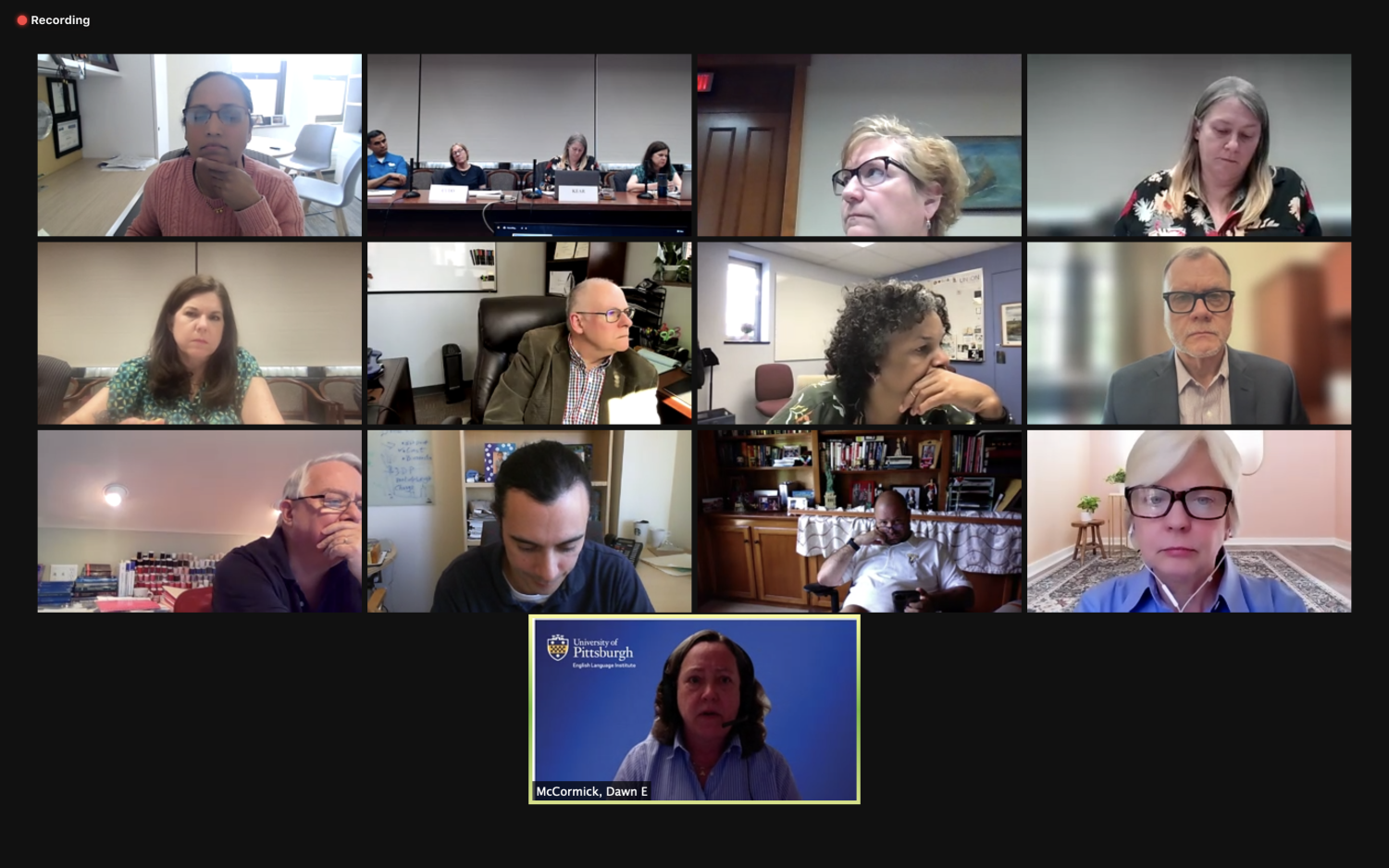Faculty Assembly talks community engaged scholarship, new budget model


Last Wednesday’s Faculty Assembly meeting.
Faculty Assembly President Robin Kear and Vice President Kris Kanthak discussed two documents intended to help Pitt become more equitable and uplift marginalized communities at last week’s meeting. Kanthak said the provost’s recommendations in the documents “give credit” to those who haven’t received it before.
“So under the leadership of Vice Provost John Wallace, this was a provost level committee that worked through the spring term developing these recommendations and guidance around these two areas,” Kanthak said. “These recommendations are about recognition that gives credit for work that people are already doing, and who in the past have not received credit through existing promotion and tenure guidelines.”
Along with discussing how to advance Pitt as an inclusive institution through the provost’s committee, the Faculty Assembly also focused on the new budget model and a new institutional conflict of interest policy at their meeting, held both in-person and virtually last Wednesday.
The two documents gave recommendations for promotion and tenure focused on DEI and community engaged scholarship. Kanthak emphasized that the documents list recommendations, not requirements, for researchers and faculty to focus on diversity and inclusion topics.
“If you wake up tomorrow, and you realize how your research on gluons has a really great application to DEI or to community engaged scholarship, and you may be the first person who’s thought of that, you now have a roadmap, right, of what that’s going to look like at the university level,” Kanthak said.
Provost Ann Cudd and Senior Vice Chancellor and Chief Financial Officer Hari Sastry explained Pitt’s new budget model at the meeting. Cudd said an optimal budget model aligns resources and goals, and she is hopeful the new budget model will pair the two. The new budget model is called ReSTART, short for Revenue Sharing to Accelerate Responsive Transformation, and is set to begin July 1.
The new budget model separates responsibility centers — such as departments within schools — and gives them more autonomy. Cudd said the current model does not encourage innovation at the faculty level, ultimately leading to a decline in graduate school enrollment along with a lack of development in online and continuing education.
“What we want is a budget model that corrects for these problems,” Cudd said. “So we seek a new budget model that changes decision making and empowers deans shifting the authority and accountability to the responsibility centers so that schools control their revenue generation, and therefore their ability to fund their own strategic priorities.”
The new budget model does not make each center responsible for its own revenue and expenses, an “every tub on its own bottom” method. Rather, it shares the revenue among the different responsibility centers.
Cudd said many dean candidates used a similar budget model at their universities, and Pitt is following steps taken by other large universities.
“This is best practice in terms of budget models,” Cudd said. “So we’re moving in the direction of what any new leader, I think, would expect to find at a well-functioning top research university.”
Sastry said Pitt’s new budget model is shaped after models at other universities, and responsibility centers will better understand it next year once they understand their own revenue and expenses.
“We’ve acknowledged and we’ve told all the units this is going to be a bit of a learning curve,” Sastry said. “I think this first two years is just going to be that way. You won’t really get a flavor for how this model affects you until you get through the first year of operation and you see your second year’s budget.”
Shilpa Sant, an associate professor at the School of Pharmacy, discussed the new Institutional Conflict of Interest Policy. Created by a research committee led by Bill Yates, the vice chancellor for research protections, the policy is meant to ensure conflicts of interests do not influence the integrity of research.
“This committee will be responsible for identifying the potential institutional conflict of interests, and also provide the management plan [to resolve the conflict of interest],” Sant said.
The policy sets triggerable thresholds to identify conflicts of interest. 13 associate professors will join the committee led by Yates to implement the policy, which is modeled off of those at other major research universities, according to Yates
“The good thing about institutional conflict of interest policies is that all of our peers have one and they all look really alike,” Yates said. “There’s just not a lot of daylight between the differences. It’s kind of the degrees of freedom, as my people say, the sort of the governance architecture and the dollar signs on the triggers, and this committee did a lot of work to determine what was right for Pitt.”
The Assembly passed the policy with 37 votes in favor and 3 abstaining.
Recent Posts
Frustrations in Final Four: Pitt volleyball collects fourth straight loss in Final Four
The best team in Pitt volleyball history fell short in the Final Four to Louisville…
Olivia Babcock wins AVCA National Player of the Year
Pitt volleyball sophomore opposite hitter Olivia Babcock won AVCA National Player of the Year on…
Photos: Pitt women’s basketball falters against Miami
Pitt women’s basketball fell to Miami 56-62 on Sunday at the Petersen Events Center.
Photos: Pitt volleyball downs Kentucky
Pitt volleyball swept Kentucky to advance to the NCAA Semifinals in Louisville on Saturday at…
Photos: Pitt wrestling falls to Ohio State
Pitt Wrestling fell to Ohio State 17-20 on Friday at Fitzgerald Field House. [gallery ids="192931,192930,192929,192928,192927"]
Photos: Pitt volleyball survives Oregon
Pitt volleyball survived a five-set thriller against Oregon during the third round of the NCAA…

